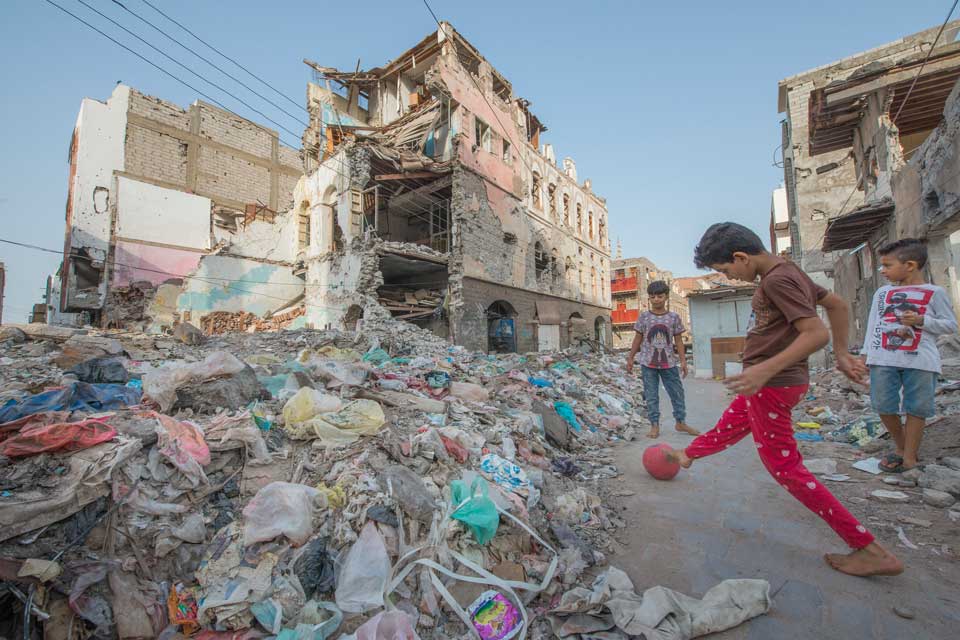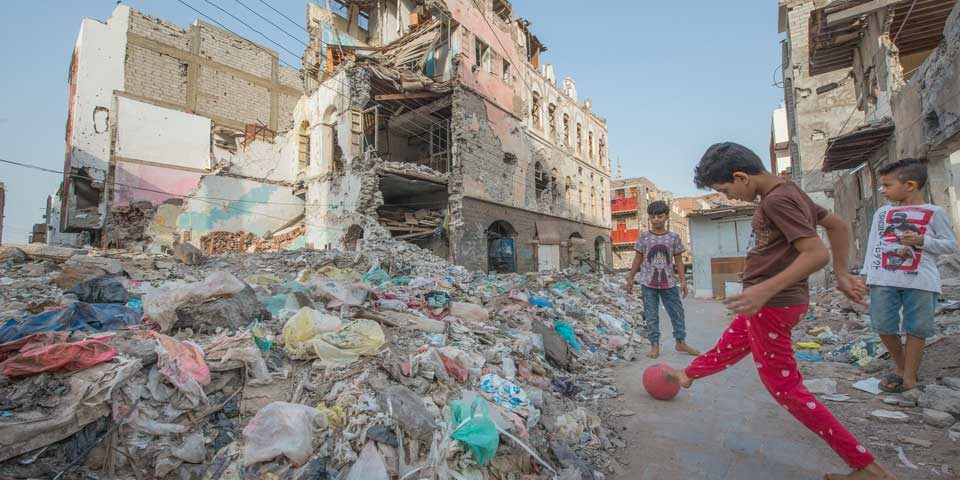NGOs and experts mark the UN’s #envconflictday 2019 with a joint statement urging progress on conflict and the environment

103 NGOs and experts from 33 countries have marked the UN day on conflict and the environment by calling on the international community to take bold actions before, during and after armed conflicts to protect people and ecosystems.
The signatories underline their call by drawing attention to a series of serious incidents in ongoing conflicts that have harmed people and the environment. They argue that, although more attention than ever before is being paid to how environmental factors can lead to conflicts, how the environment is affected by conflicts, and how the environment can help restore peace, this has yet to translate into meaningful change on the ground.
The NGOs are active in the fields of human rights, humanitarian disarmament, development and environmental protection, and are joined by leading experts in conservation, international law, public health, peacebuilding and other fields.
“There has been a huge shift in awareness and understanding of the environmental dimensions of conflicts during the last decade,” said Doug Weir, CEOBS’ Research and Policy Director. “Progress is being made but converting this into policies and practice that create genuine change on the ground is now a priority. We urge all states and stakeholders to engage with processes on the environment, peace and security that can help reduce harm to people and ecosystems.”
The signatories welcome the trend to recognise the important links between the environment, peace and security, citing UN-led efforts to strengthen the laws protecting the environment in relation to armed conflicts, and to establish a Climate Security Mechanism. They also welcome the increasing recognition of the role of the environment in the protection of civilians, and steps to mainstream the environment in post-conflict recovery and peacebuilding.
New constituencies have also engaged on the topic, with conservation experts recently calling for measures to protect biodiversity in areas affected by conflict. The signatories argue that this momentum for change has been underpinned by a growth in understanding about the connections between the environment and armed conflicts.
It is vital that the international community builds on this momentum to ensure that the environment is accepted as a critical component of peace and security. To do so, governments should draw on the knowledge of civil society, experts and communities to help develop policies that can protect human health and ecosystems, and restore damaged environments.
November 6 is the UN’s day for Preventing the Exploitation of the Environment in War and Armed Conflict, which aims to increase awareness of the environmental dimensions of armed conflicts.
Joint statement
From words to action: time to act on the environment, peace and security
Over the past year, the crises facing the global environment have become more visible than ever before. The climate emergency, biodiversity collapse, plastic pollution and the murder of environmental defenders have driven powerful civil society movements demanding change. Now is the time for leadership and bold actions to deliver this change and safeguard our environment.
Just as international civil society movements are demanding bold action to combat global environmental threats, so communities and activists in states affected by conflicts are calling for action to prevent and address the environmental consequences of wars. Whether it is the deliberate burning of crops in the Middle East, massive deforestation in protected areas in Colombia, or attacks on water and oil infrastructure in Libya, Iraq, Saudi Arabia, Yemen and Syria, it is the environment and the people depending on it that suffer.
Environmental degradation threatens peace and security, while conflicts can have a devastating impact on ecosystems, and on human health and livelihoods. By reversing sustainable development, they undermine progress towards tackling the massive environmental challenges that we face in the 21st century. Peace and security relies on healthy and productive ecosystems and a protected environment, just as environmental protection relies on peaceful societies.
Our 103 signatories are drawn from many different organisations and experts who are working to improve our understanding of the connections between the environment, peace and security, and to identify opportunities to protect people and ecosystems. And there are no shortage of opportunities.
Where once the environment was a “silent victim” of conflicts, on-the-ground data collection and reporting, innovative research and technologies are improving the visibility of environmental damage and our understanding of its causes. This information will help drive the development of the transformative policies that are urgently needed to reduce harm and help build peace.
We welcome the many initiatives that have emerged in recent years on the environmental dimensions of armed conflicts. From local advocacy to international legal and security policy debates, to new processes to integrate environmental protection into humanitarian response and post-conflict recovery.
But in many cases these initiatives have not yet translated into change on the ground and, just as 2019 has highlighted the urgency of action to address global environmental crises, so it is also time for bold action from the international community on the environment, peace and security.
To move from words to action this #envconflictday, the international community must:
-
Establish the capacity to identify, act on and mitigate the environmental risks that can lead to armed conflicts.
-
Strengthen, implement and respect the laws protecting the environment in relation to armed conflicts, and hold those responsible for harm to account.
-
Assess environmental risks and assist victims after conflicts, remediate damage, and employ all the environmentally sound tools at its disposal to regenerate ecosystems while supporting communities to build sustainable peace.
Signatories
| Organisation | Expert |
|---|---|
| Action on Armed Violence (UK) | Dr. Adriana Erthal Abdenur |
| Airwars (UK) | Dra. Teresa Abáigar, Spanish National Research Council (CSIC) |
| Al-Haq (SoP) | Dr. Matthew Bolton, Director, International Disarmament Institute, Pace University (USA) |
| Armed Conflict and Civilian Protection Initiative, Harvard Law School (USA) | Dr. Nancy E. Boyer, Affiliated Assistant Professor, Department of Geography, University of Delaware |
| Article 36 (UK) | Dr Guy Cowlishaw, Zoological Society of London, UK |
| Association de Prise en Charge des Orphelins de Guerre (BUR) | Dr. Pierre-André Crochet, Centre National de la Recherche Scientifique (CNRS) |
| Association for Human Rights in Kurdistan of Iran-Geneva (CH) | Daniëlla Dam-de Jong, Associate Professor, Grotius Centre for International Legal Studies, Leiden University |
| Associazione Nazionale Vittime Civili di Guerra (ITA) | Dr. Pinar Dinc, Researcher, Center for Middle Eastern Studies, Lund University (SE) |
| Ban Landmines Campaign Nepal | Dr. Marianna Dudley, Co-director of the University of Bristol Centre for Environmental Humanities |
| Biosecure Ltd (UK) | Prof. Sarah Durant, Zoological Society of London, UK |
| Campaña Colombiana Contra Minas (COL) | Dr. Lina Eklund, Assistant Professor, Aalborg University |
| Centre for Environmental Humanities, University of Bristol (UK) | Juanita Esguerra-Rezk, Research Associate, Peace Accords Matrix (Kroc Institute for International Peace Studies - University of Notre Dame) |
| Conflict and Environment Observatory (UK) | Dr. Peter Gleick, Pacific Institute for Studies in Development, Environment, and Security |
| Conflict and Health Research Group, King’s College London (UK) | Dr. Julia Gorricho, Project Officer for South America, WWF Germany |
| Conflict Awareness Project (US) | Dr. Rosemary Groom, Southern African Coordinator, Range Wide Conservation Program for Cheetah and African Wild Dogs, Zoological Society of London |
| Congolese Campaign To Ban Landmines (DRC/AUS) | Dr. Emma Hakala, Finnish Institute of International Affairs / BIOS Research Unit |
| Disarmament Dynamics (UK) | Eleanor Harvie, Africa Programme, Zoological Society of London |
| ECPAT Guatemala | Prof. Karen Hulme, Law School, University of Essex |
| Environmental Law Institute (US) | Dr. Elaine (Lan Yin) Hsiao, Global Challenges Fellow, Sheffield Institute for International Development (SIID) / Co-Chair, IUCN CEESP Theme on Environment and Peace |
| Environmentalists Against War (US) | Jasper Humphreys, Research Director, The Marjan Centre, King’s College, London |
| Facing Finance (GER) | Dr. Stasja Koot, Sociology of Development and Change, Wageningen University, the Netherlands |
| Fight for Humanity (CH) | Dr. Torsten Krause, Assistant Professor, Lund University |
| Foundation Network of Survivors and People with Disabilities (SLV) | Olivia Lazard, Director at Peace in Design Consulting Ltd |
| Fundación Instituto de Ecología Política (CHE) | Miguel Londoño, Global Green Growth Institute (GGGI) |
| Geneva Water Hub (CH) | Dr. Maria Andrea Nardi, Affiliated Researcher, Director of Studies, Raoul Wallenberg Institute of Human Rights and Humanitarian Law and Lund University (Sweden) |
| Global Water 2020 (US) | Dr. David Olson, WWF Hong Kong |
| Humanitarian Mine Action Initiative (MYM) | MSc. Liliana Pimentel, PhD Candidate at Universidade de Brasilia. Former Hubert Humphrey Fellow. Member of The Climate Leadership Corps Brazilian branch, OLAC and EnPax. |
| IANSA Women's Network Nigeria | Glen Plant, Author: Environmental Protection and the Law of War |
| Igarapé Institute (BRA) | Prof. Juan M Pleguezuelos, Granada University, Spain |
| Indian Institute for Peace, Disarmament and Environmental Protection | Diana Rice, Dawson College Peace Centre, Dawson College, QC, Canada |
| Institute of Environmental Management and Assessment (UK) | Jo Rodrigues, Gender & Conflict Resolution Consultant |
| International Coalition to Ban Uranium Weapons (GER) | Dr. Roberto Lázaro Suau, Arid Zones Experimental Station, Almeria, institute belonging to the Spanish National Research Council (CSIC) |
| International Women’s Rights Project (CAN) | Juliane Schillinger, PhD Candidate, University of Twente |
| Iraqi Health and Social Care Organization (IRQ) | Gar Smith, Author: The War and Environment Reader |
| Italian Campaign Against Landmines | Dr. Britta Sjöstedt, Faculty of Law, Lund University |
| Japan Campaign to Ban Landmines | Dr. Alaaeldin Soultan, Department of Ecology, Swedish University of Agricultural Sciences. |
| Journalists for Human Rights (North Macedonia) | Prof. Richard Sullivan, King’s College London |
| Mercy Corps (US) | Kristin Weis, Coastal Management and Community Resilience Consultant |
| Mines Action Canada | Zabrina Welter, Scientific Researcher, University of Freiburg |
| Mines Advisory Group (UK) | Prof. Rosie Woodroffe, Zoological Society of London, UK |
| Nobel Women’s Initiative (CAN) | |
| Nonviolence International Canada | |
| Nonviolence International Southeast Asia (THA) | |
| Norwegian People’s Aid | |
| PAX (NL) | |
| Peace Movement Aotearoa (NZ) | |
| Peace Rising (USA) | |
| Promoçao da Paz, Prevençao do Crime e Reintegraçao Social (MOZ) | |
| Save the Tigris Campaign, Iraq | |
| Society for the Environment (UK) | |
| Soka Gakkai International (JAP) | |
| Somali Human Rights Association | |
| Sustainable Peace and Development Organization (PAK) | |
| The Initiative for a Mine Free Turkey | |
| The Iraqi Environment and Health Society - UK | |
| Uganda Landmine Survivors Association | |
| Vision GRAM - International (CAN/DRC) | |
| West Virginia Campaign to Ban Landmines and Cluster Bombs/PSALM: Proud Students Against Landmines and Cluster Bombs (US) | |
| Win Without War (US) | |
| Women Development Society (IND) | |
| Women’s International League for Peace and Freedom Norway | |
| Zoï Environment Network (CH) | |
| Zoological Society of London (UK) |
Countries
The signatories of this statement are based in the following 33 countries:
Australia, Brazil, Burundi, Chile, China, Colombia, DRC, Finland, France, Germany, Guatemala, India, Iraq, Italy, Japan, Mozambique, Myanmar, Nepal, Netherlands, New Zealand, Nigeria, North Macedonia, Norway, Pakistan, Slovenia, Somalia, Spain, State of Palestine, Sweden, Switzerland, Thailand, UK, US.





